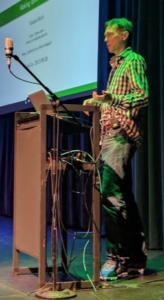Quick Q: C++11 lambdas can access my private members. Why?
Quick A: initialisers can access private members.
Recently on SO:
C++11 lambdas can access my private members. Why?
The initializer expression in the definition of a static data member is in the scope of its class...

 Up for it?
Up for it? Do you do that?
Do you do that?